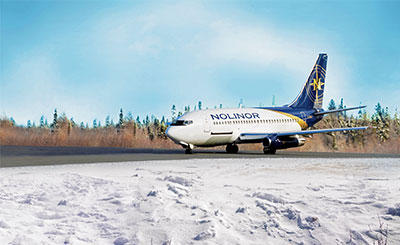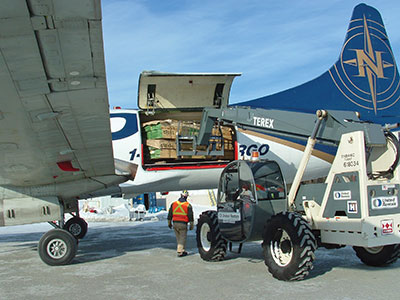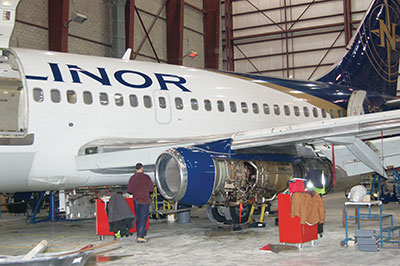
Features
Operations
Flying under the radar
There are a number of Canadian airlines that fly under the radar because of their size or because they don’t get a lot of media coverage, or for both reasons.
March 3, 2014 By Brian Dunn
There are a number of Canadian airlines that fly under the radar because of their size or because they don’t get a lot of media coverage, or for both reasons. One of them is Nolinor Aviation.
 |
|
| In 2007, Nolinor acquired two ex-Royal Air Maroc Boeing 737-200 combi aircraft and another 737-200 full freight aircraft in 2011. Photo: Nolinor
|
Founded in 1992, Nolinor is an air transport company that specializes in commercial charter flights out of Mirabel airport in Montreal. Its fleet of five Convair 580s and four Boeing 737-200s are a combination of combi or full-freight aircraft that can be easily configured a number of ways depending on clients’ diverse requirements for transporting passengers, cargo, or both. Nolinor serves all regions of Canada, the United States and other international destinations, including remote regions – its specialty – where gravel and ice runways are the norm. About 80 per cent of its business from close to 20 clients under contract is generated in Canada, 15 per cent in the U.S. and the remaining five per cent outside of North America.
Some of its 737s are equipped with gravel kits which consist of a deflector on the front landing gear to protect the aircraft from stones on gravel runways and a vortex dissipater under each engine to prevent similar debris being sucked into the engines.
In just one hour, passenger planes can be reconfigured in a number of different ways. The Convair aircraft can accommodate from 32 to 50 passengers, while the 737-200s can comfortably seat 11 to 119 people. The 11-passenger configuration allows the transport of six pallets, 29 passengers allows five pallets, 34 passengers equals four pallets, 59 equals three pallets and 77 passengers allows two pallets of cargo.
Nolinor is a combination of the words nolis (charter) and nord (north). It began operations mainly to service hunting and fishing outfitters in the Schefferville area in Northern Quebec near the Labrador border, then provided charter services for passengers and freight. Since June 1999, it has been doing its own aircraft maintenance. In 2001, the company bought its first full cargo Convair and took over a daily flight between Dorval (now Trudeau International Airport) and Cincinnati for DHL Express after acquiring Air Wave Airlines which held the contract. DHL remains a client today. In order to respond to the growing cargo market, it purchased two more full cargo Convair 580s in 2004. In 2006, the fourth passenger Convair 580 was delivered.
 |
|
| Nolinor began operations mainly to service hunting and fishing outfitters in the Schefferville area in Northern Quebec near the Labrador border. Photo: Nolinor
|
While the 580 is a relatively old aircraft no longer in production, it’s a real workhorse and fits the needs of Nolinor, according to Yves Bergeron, director of flight operations. “It’s fast for a turboprop, faster than a Dash 8 and has lots of cargo space and good range,” he says. “It has a true air speed of 285 knots with a range of up to 1,000 nautical miles, depending on the payload.”
In 2000, Nolinor president Jacques Prud’homme was offered a 24 per cent share of the company before becoming sole shareholder in 2011. Before that, he ran Cargair between 1968 to 1988, when he sold it to his brother. With expansion, Nolinor needed more space for its fleet and in 2005 the company moved its maintenance facilities from Trudeau, where it was leasing space from now defunct Skyservice Airlines, to Mirabel. The tarmac has more than 300,000 square feet and provides sufficient parking for all of Nolinor’s aircraft and any new aircraft it acquires.
Nolinor moved into the 100,000-square-foot hangar formerly occupied by Air Transat (which relocated to Trudeau) and shares it 50-50 with Avianor Inc., a privately-held corporation that specializes in aircraft maintenance and component maintenance (seats, wheels and brakes), manufacturing (crew seats and cabin interior items) and cabin modification. It would seem to be a no brainer to contract out its maintenance to its neighbour, but Bergeron said Nolinor wants to control its costs by doing it themselves.
Nolinor has been honoured on three separate occasions by the annual National Bank of Canada’s SME Awards for its strong performance and excellent management. In 2006 and 2009, Nolinor won Gold in the SME category for the Laval-North Western Quebec region. In 2006, it won Bronze in the same category at the provincial level.
In 2007, Nolinor acquired two
ex-Royal Air Maroc Boeing 737-200 combi aircraft and another 737-200, full freight aircraft in 2011. Its last 737-200 combi aircraft was scheduled to join the fleet on May 1.
The company outfitted one of its Boeing 737s with a gravel runway kit to meet ever-increasing transportation demands in the Canadian North with the capacity to transport 119 passengers to extremely remote villages, a pressing need for mining companies. In order to meet the growing demand for its services, two of the four 737s are able to operate on gravel airstrips. The fourth is a full cargo aircraft with a payload of 35,000 pounds of cargo. Three of the five Convairs can carry between 30 and 50 passengers, while the two cargo aircraft can carry more than 15,000 pounds of cargo. Bergeron estimates cargo accounts for 30 per cent of company revenue, while 70 per cent is generated by passenger flights which includes combi flights. When the recession hit in 2008, Nolinor was able to contract out two of its Convairs in Africa for transporting cargo between Libreville and Port Gentil in Gabon.
Nolinor employs a Type B operational dispatch system, similar to that used by Air Canada, Air Transat and WestJet and all its aircraft are equipped with Flight Tracker software to track an aircraft’s route progress. The company has between 125 to 150 employees depending on the season, consisting of pilots, flight attendants, certified flight dispatchers and mechanics. Together, they ensure the reliability of flights and allow it to offer the best service in the industry, according to Bergeron. He cites an incident that occurred in March 2011, when Nolinor got a call at 4 a.m. to evacuate 350 people from client Alnico Eagle Limited Mines site in Meadowbank, Nunavut.
“We dispatched five aircraft and 17 hours later, they were all back in Montreal. We tried contacting other airlines, but nobody was available,” he says. “We were able to come through, because we are a strictly charter operation which gives us flexibility. Other scheduled airlines only do charter when they have excess capacity. And because we fly to remote regions where maintenance may not be available, all our flights have an engineer on board.”
 |
|
| Nolinor has now moved into the 100,000-square-foot hangar formerly occupied by Air Transat, which subsequently relocated to Trudeau. Photo: Brian Dunn
|
For the past 20 years, Nolinor has developed air transportation expertise in Quebec’s north, a strategy that sets it apart from the competition, according to Prud’homme. As a private company and because of stiff competition, he would not divulge sales figures, total flying hours or the names of clients, but claimed Nolinor is profitable, despite the fact most of his competitors receive government subsidies.
“I can say that our major clients are involved in the mining industry, courier business and tourism,” says Prud’homme. “We carry tourists as far west as Winnipeg and Vancouver. Our clients can call us 24 hours a day, seven days a week. That’s why we have two of the largest mining companies in Canada under contract.”
Nolinor was designated last January, for the third consecutive year, as the air carrier for the mining teams of Agnico Eagle Limited Mines, between Montreal and Meadowbank, Nunavut and also carry supplies between Thompson and Meadowbank for the same company.
Another mining client is Baffinland, which is 50 per cent owned by ArcelorMittal and 50 per cent by Nunavut Iron Ore, with ArcelorMittal remaining as the project operator. To help it bid on mining contracts, Nolinor has teamed with Sarvaq Logistics, a specialized group of expediting and freight forwarding experts based at the Iqaluit International Airport.
On Sept. 25, Nolinor began charter service from Waterloo International Airport to Baffinland’s Mary River iron ore site in Nunavut via the Iqaluit Airport using a B737-200 with three times weekly service and a fourth flight every other week.
“Waterloo offered the best operating cost and it was what the customer wanted,” says Bergeron. “We needed an airport that operated 24 hours a day and Pearson was too expensive and had too many restrictions.” Waterloo is also close to Baffinland’s head office in Oakville.
“Our exposure to the mining industry has attracted a lot of interest from other mining companies,” says Bergeron. “Our next aircraft purchase will probably be a Hercules which is the best cargo aircraft available.” In fact, Nolinor had agreed to purchase two Lockheed 100-30s (the civil variant of the military C-130 Hercules) in 2012, but they had exceeded their lifetime cycle under new FAA regulations and the deal was cancelled.
“Right now, the mining sector is down. But as soon as it returns, we’ll consider the Hercules again,” says Prud’homme. “As for future growth, the courier business is interesting for us and we’re looking at offering scheduled service. But our niche is the north, so we’re also looking at things like DND and the Coast Guard as potential customers.”
And who knows what opportunities lie ahead if Quebec’s ambitious Plan Nord to exploit the province’s huge northern mining potential ever gets untracked.